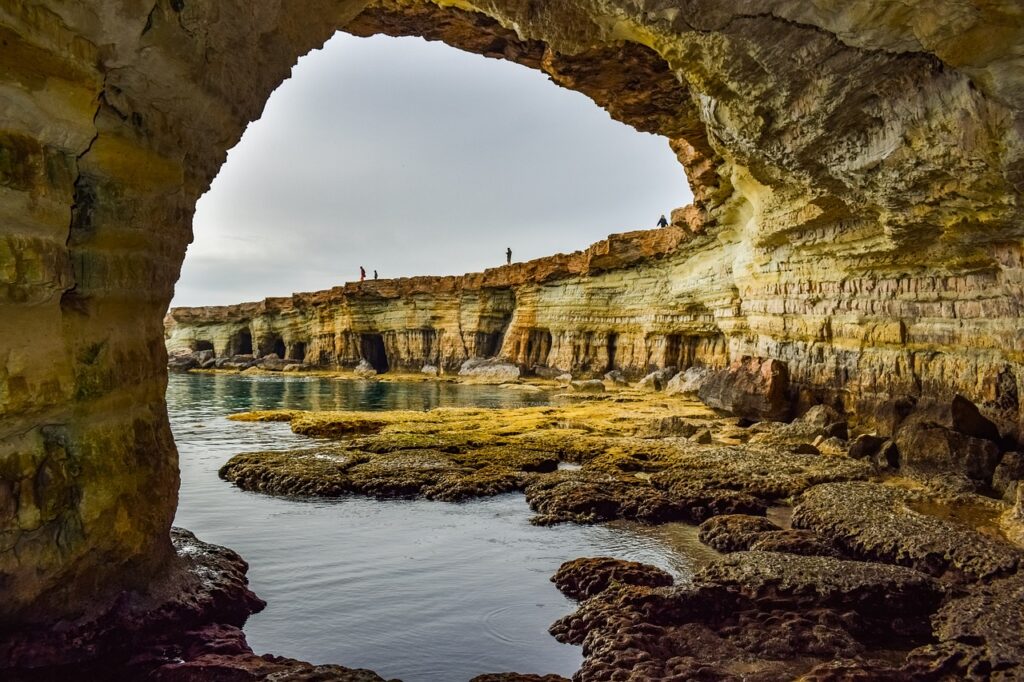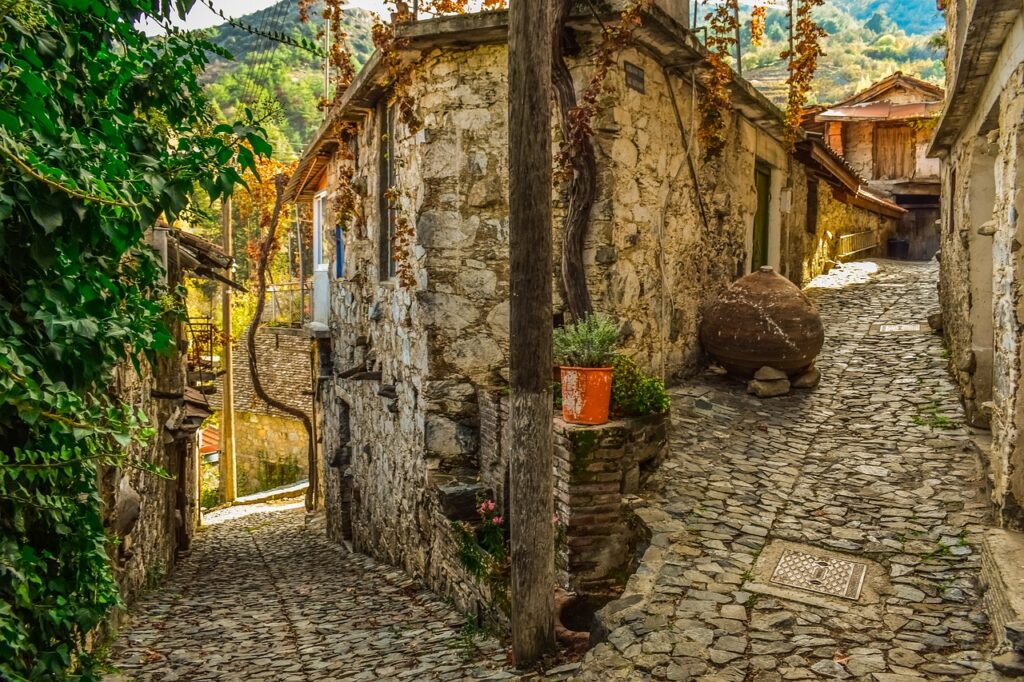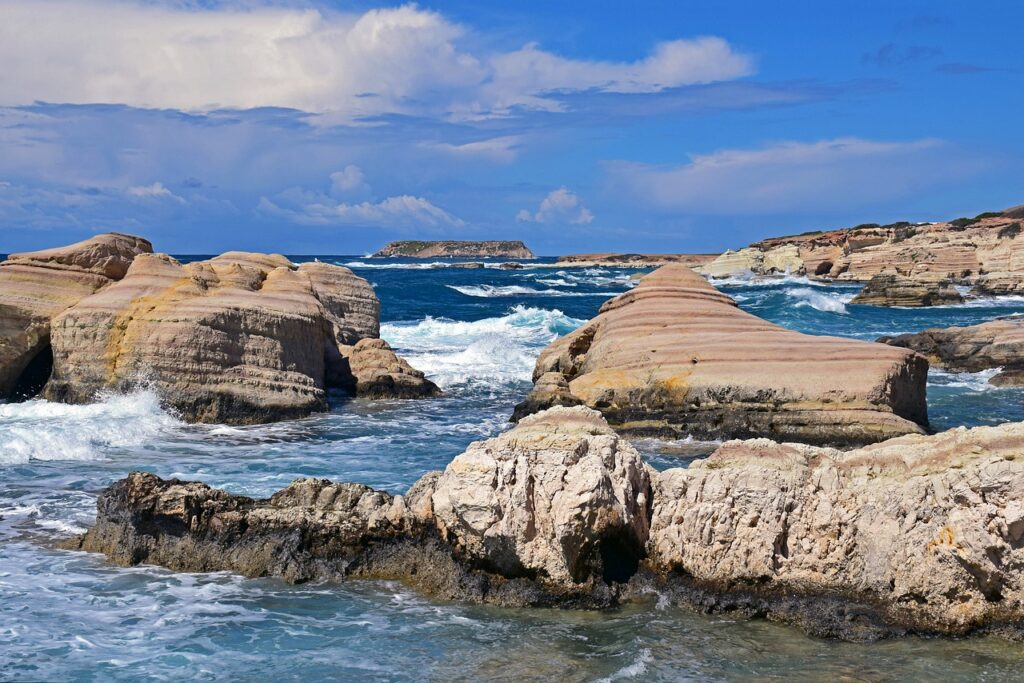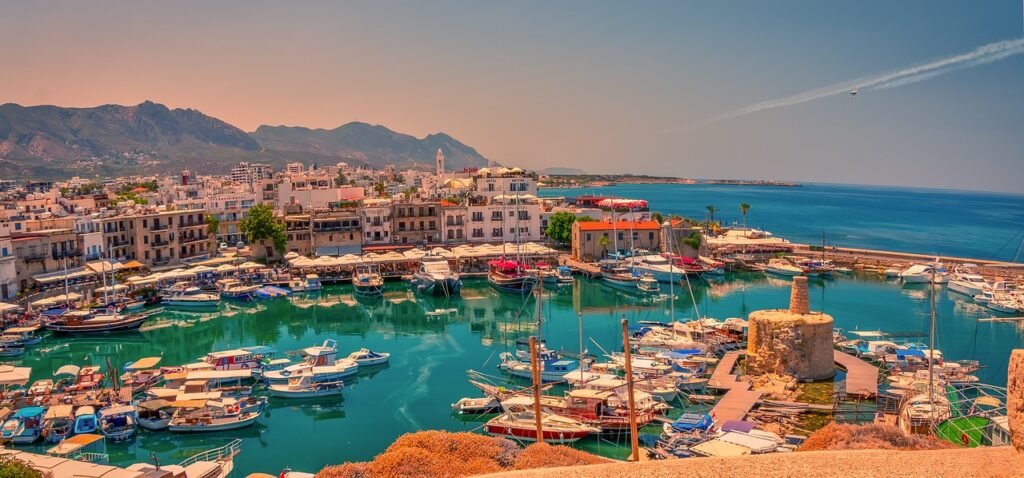Tucked away in the eastern Mediterranean, Cyprus is a haven of ancient history, striking landscapes, and exuberance. From the sun-kissed beaches of Ayia Napa to the crumbling ruins of Kourion, this small island state is only an Eden for travelers in quest of adventure, beauty, and reasonability.
But Cyprus has much more to offer than just these categories of travelers. The tiny, enchanting island has something almost no other destination can boast: a peculiar combination of affordability, ease of access, and a hint of off-the-beaten-path exploration for the very broke, international backpacker. Rich history, food, and people make Cyprus an ultimate destination for travelers on an extreme broke budget.
In this guide, we show you how to experience the best of Cyprus without breaking the bank. We take you from hitchhiking through the Troodos Mountains to camping on secluded beaches, with insider tips and tricks on how to explore this incredible island in the most budget-friendly way.
So, if you are ready to discover hidden beauties, dive into Cypriot culture, and get exposed to the Mediterranean sun, join us on this broke backpacking adventure through Cyprus.
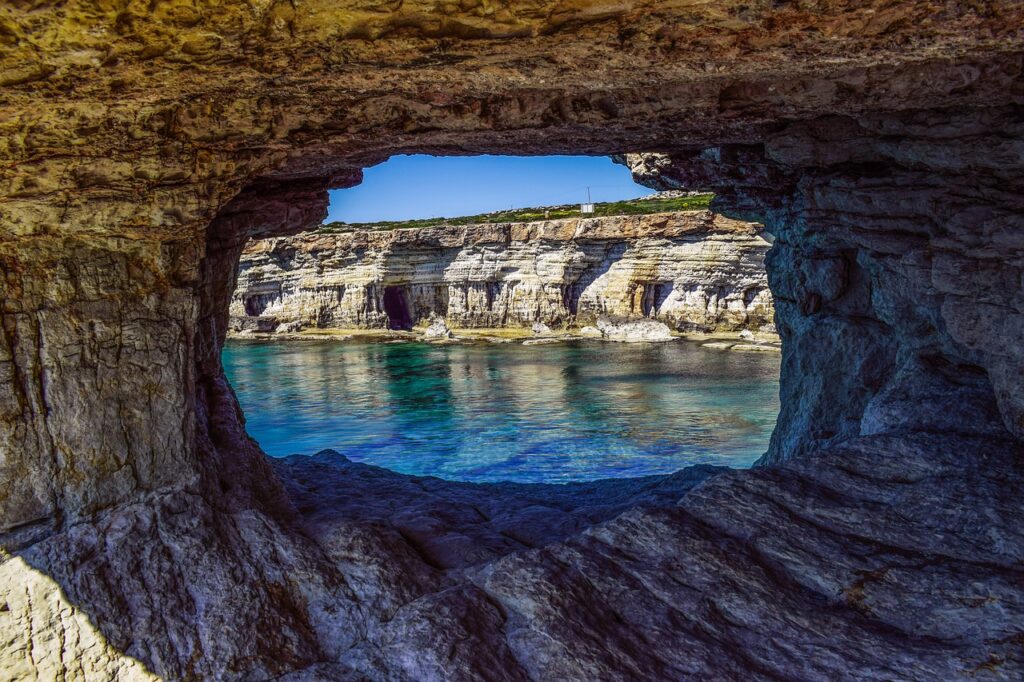
When to go:
Spring (March to May)
- Weather: Mild and sunny, perfect for hiking and outdoor activities
- Pros:
- Fewer tourists, lower prices for accommodations and tourist services
- Beautiful wildflowers and green landscapes
- Cons:
- Some tourist attractions and beaches might still be closed
Summer (June to August)
- Weather: Hot and dry, ideal for beach-hopping and water activities
- Pros:
- Warm weather, long days, and vibrant beach life
- Festivals and events like the Ayia Napa Festival and Limassol Carnival
- Cons:
- Peak tourist season, higher prices, and crowded areas
Autumn (September to November)
- Weather: Warm and sunny, great for outdoor activities and sightseeing
- Pros:
- Comfortable temperatures, fewer tourists, and lower prices
- Harvest season, enjoy local wines and festivals
- Cons:
- Some attractions might start closing for the season
Winter (December to February)
- Weather: Cool and wet, ideal for exploring cities and historical sites
- Pros:
- Low prices, fewer tourists, and a more authentic experience
- Christmas markets and festivities
- Cons:
- Some tourist attractions and beaches might be closed or have limited hours
Best Time for Broke Backpackers:
Considering the factors, spring (April-May) and autumn (September-October) are the best times for broke backpackers to visit Cyprus. Enjoy comfortable weather, fewer tourists, and lower prices, making it an ideal time for outdoor activities, sightseeing, and cultural experiences.
Best Itineraries:
4-Day Itinerary
Day 1: Arrival in Larnaca, explore the city, and visit the Hala Sultan Tekke mosque
Day 2: Bus to Nicosia (Lefkosia), explore the old town, and visit the Cyprus Museum (free admission)
Day 3: Bus to Ayia Napa, relax on Nissi Beach, and enjoy the nightlife
Day 4: Return to Larnaca, visit the Larnaca Salt Lake, and depart
1-Week Itinerary
Day 1-2: Larnaca and Nicosia (as above)
Day 3-4: Ayia Napa (as above)
Day 5: Bus to Limassol, explore the old town, and visit the Limassol Castle (€4.50 admission)
Day 6: Visit the Kourion Archaeological Site (€4.50 admission) and relax on Episkopi Beach
Day 7: Return to Larnaca and depart
2-Week Itinerary
Day 1-7: Follow the 1-week itinerary
Day 8-9: Bus to Paphos, explore the old town, and visit the Paphos Archaeological Park (€4.50 admission)
Day 10-11: Visit the Akamas Peninsula for hiking and scenic views
Day 12-13: Relax in Latchi and enjoy water activities
Day 14: Return to Larnaca and depart
1-Month Itinerary
Day 1-14: Follow the 2-week itinerary
Day 15-21: Explore the Troodos Mountains, visit villages like Omodos and Kakopetria
Day 22-28: Relax in coastal towns like Larnaca, Limassol, and Paphos
Day 29-30: Visit the Karpas Peninsula in Northern Cyprus (note: research necessary documents and restrictions)
3-Month Itinerary
Month 1: Exploring the Mainland
Week 1-2: Larnaca and surrounding areas
- Explore Larnaca’s seafront promenade and historic fort
- Visit the nearby villages of Lefkara and Kiti
- Hike to the Caledonian Falls
Week 3-4: Nicosia and the Troodos Mountains
- Explore Nicosia’s old town and city walls
- Visit the Cyprus Museum and Leventis Municipal Museum
- Hike and camp in the Troodos Mountains
Week 5: Limassol and the south coast
- Explore Limassol’s old town and castle
- Visit the ancient city of Kourion
- Relax on the beaches of Lady’s Mile
Month 2: Island Hopping
Week 6-7: Kastellorizo (Megisti), Greece
- Take a ferry from Larnaca to Kastellorizo
- Explore the island’s colorful harbor and castle
- Snorkel or dive in the crystal-clear waters
Week 8-9: Rhodes, Greece
- Take a ferry from Kastellorizo to Rhodes
- Explore the UNESCO-listed old town and Acropolis
- Visit the Palace of the Grand Master of the Knights of Rhodes
Week 10: Return to Cyprus and explore Paphos
- Visit the ancient city of Paphos and its stunning mosaics
- Explore the Tombs of the Kings and the Paphos Castle
Month 3: Northern Cyprus and the East Coast
Week 11-12: Kyrenia (Girne) and the north coast
- Cross into Northern Cyprus and explore Kyrenia’s harbor
- Visit the nearby castles of St. Hilarion and Buffavento
- Hike in the Pentadaktylos Mountains
Week 13: Famagusta and the east coast
- Explore Famagusta’s abandoned city and beach
- Visit the nearby ancient city of Salamis
- Relax on the beaches of Ayia Napa
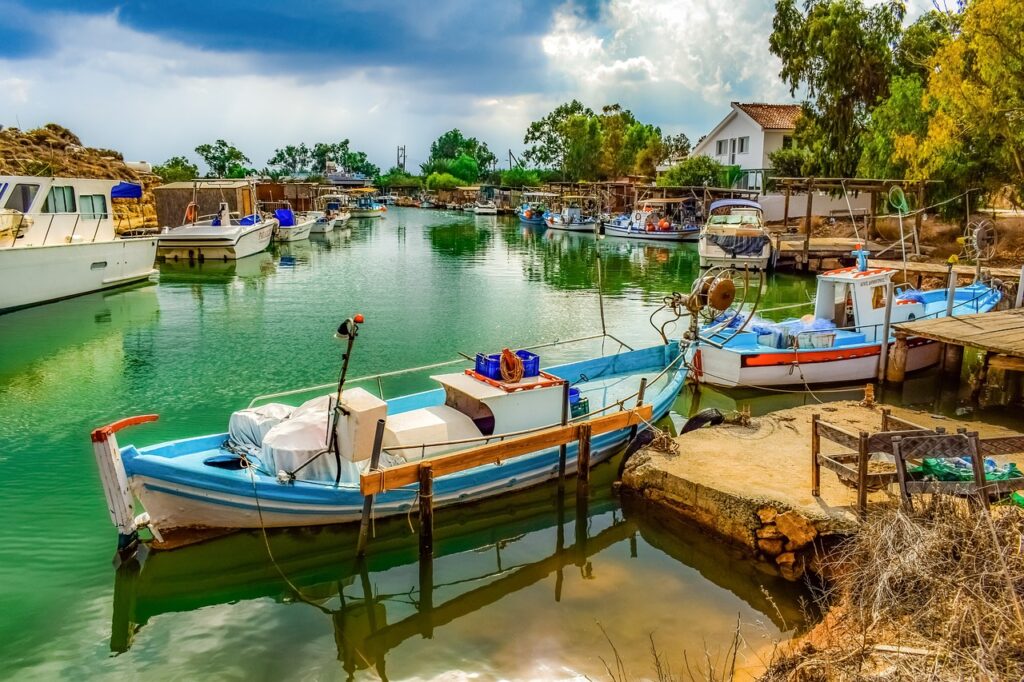
Transportation:
Buses
- Inter-City Buses: Connect major cities like Nicosia, Larnaca, Limassol, and Paphos
- Urban Buses: Serve cities and towns, with frequent routes and stops
- Rural Buses: Link villages and rural areas to nearby towns and cities
Bus Operators:
- Nicosia: Nicosia Public Transport (NPT)
- Larnaca: Larnaca Public Transport (LPT)
- Limassol: Limassol Public Transport (LPT)
- Paphos: Paphos Public Transport (PPT)
Fares:
- Single Ticket: €1-2
- Daily Pass: €5-10
- Weekly Pass: €20-30
Taxis
- Shared Taxis (Service Taxis): Operate on fixed routes, like buses
- Private Taxis: Available for hire, but more expensive
Fares:
- Shared Taxi: €2-5
- Private Taxi: €20-50 (depending on distance)
Top things to do:
Nicosia (Lefkosia)
- Visit the Cyprus Museum (free admission)
- Explore the old town and city walls
- Check out the Ledra Palace Crossing (the last divided capital in the world)
- Wander through the Makarios Avenue and Ledra Street for shopping and food
- Visit the Leventis Municipal Museum (free admission)
- Explore the Hamam Omerye Baths (€10 admission)
Larnaca
- Relax on McKenzie Beach and Finikoudes Beach
- Visit the Hala Sultan Tekke mosque (free admission)
- Explore the Larnaca Salt Lake and its scenic views
- Enjoy the Larnaca Marina and its seafood restaurants
- Visit the Pierides Museum (free admission)
- Explore the Larnaca Fort (€2.50 admission)
Limassol
- Visit the Limassol Castle (€4.50 admission)
- Explore the old town and its narrow streets
- Check out the Limassol Marina and its shopping centers
- Relax on Governor’s Beach and Lady’s Mile Beach
- Visit the Limassol Archaeological Museum (€4.50 admission)
- Explore the Kolossi Castle (€2.50 admission)
Paphos
- Explore the Paphos Archaeological Park (€4.50 admission)
- Visit the Tombs of the Kings (€2.50 admission)
- Check out the Paphos Harbour and its seafood restaurants
- Relax on Coral Bay Beach and Alykes Beach
- Visit the Paphos Aphrodite Waterpark (€30 admission)
- Explore the Paphos Old Town and its shopping streets
Ayia Napa
- Party in the Ayia Napa Square and its bars
- Relax on Nissi Beach and its crystal-clear waters
- Visit the Ayia Napa Monastery (free admission)
- Enjoy water activities like snorkeling and diving
- Visit the Ayia Napa Sea Caves (free admission)
- Explore the Cape Greco National Forest Park
Troodos Mountains
- Hike in the Troodos Mountains and its scenic trails
- Visit the Omodos village and its wine production
- Explore the Kakopetria village and its traditional architecture
- Check out the Troodos National Forest Park
- Visit the Kykkos Monastery (free admission)
- Explore the Myllomeri Waterfall
Karpas Peninsula (Northern Cyprus)
- Visit the Karpas Beach and its natural beauty
- Explore the Dipkarpaz village and its scenic views
- Check out the Apostolos Andreas Monastery (free admission)
- Enjoy the Karpas National Park
- Visit the Golden Beach and its crystal-clear waters
- Explore the Rizokarpaso village and its traditional architecture
Other Areas
- Visit the Akamas Peninsula for hiking and scenic views
- Explore the Latchi Harbour and its seafood restaurants
- Relax on the Polis Beach and its crystal-clear waters
- Visit the Aphrodite’s Rock (Petra tou Romiou) and its scenic views
Food:
Eating on a budget in Cyprus is very easy. Street food is around, as well as restaurants and local tavernas with delicious dishes served at reasonable prices. Traditional Cypriot cuisine relies heavily on fresh ingredients, herbs, and spices, so even simple meals are intensely flavored.
Meanwhile, for the poor backpacker, the food scene is like a dream come true, having hefty portions for below five bucks, with snacks coming in as low as a dollar. From the golden, crispy wheels of halloumi to the tender, grilled souvlaki, the street food in Cyprus is the real deal.
Other great options for budget-conscious travelers are the markets. Fresh produce, bread and pastries are available and most vendors will offer samples and/or give very generous portions. You can put together a picnic lunch or get snacks to last you through the day.
For local food in reasonable prices, there are “tavernas” or “ouzeris” serving traditional Cypriot dishes. These are small homes turned into restaurant establishments where one can enjoy the warmth of an atmosphere full of lively conversation and with generous portions. Sharing a meal with locals is an excellent way to immerse yourself in Cypriot culture.
It is also reflected in the Cypriot food. Most dishes contain a lot of fresh seafood, olive oil, and local herbs. It is famous for its wine production, and one glass of wine could be as cheap as $2.
The supermarkets and mini-markets will also have reasonable prices to take care of the self-catering preferences. Things like bread, cheese, and olives are very cheap to get, and most shops are fitted with a deli counter of fresh dishes prepared in their kitchens.
Cypriot food is full of history and tradition. Meal times in Cyprus are social times, and sharing meals is a huge part of Cypriot hospitality. Getting involved with it will not only save you, the poor backpacker, but further allow you to enhance your travel experience.
Flavors
The gastronomic discovery of Cyprus will be necessary because the urge is diverted from the beaten track: sightseeing in the side streets, market places, and local quarters may bring up very pleasant surprises. Do not be afraid to ask either about dishes or to try something quite different.
Food in Cyprus is not just for mere survival, but rather a sure way of celebrating culture, community, and tradition. Eating local will not only help you save money but also present an avenue to interact with warm and friendly islanders.
Authentic flavor
The food scene in Cyprus is a rude representation of its strong cultural background. From traditional dishes to the freshness of market produce, every single piece carries a story about the island’s history and traditions.
As a poor backpacker, one is going to have a culinary adventure that is totally unforgettable in Cyprus. With its authentic flavors, reasonable prices, and delicious food, this is the perfect Mediterranean island on which to indulge in flavors and connect with the locals.
So come, taste the flavors of Cyprus, and enjoy the warm hospitality of this enchanting island.
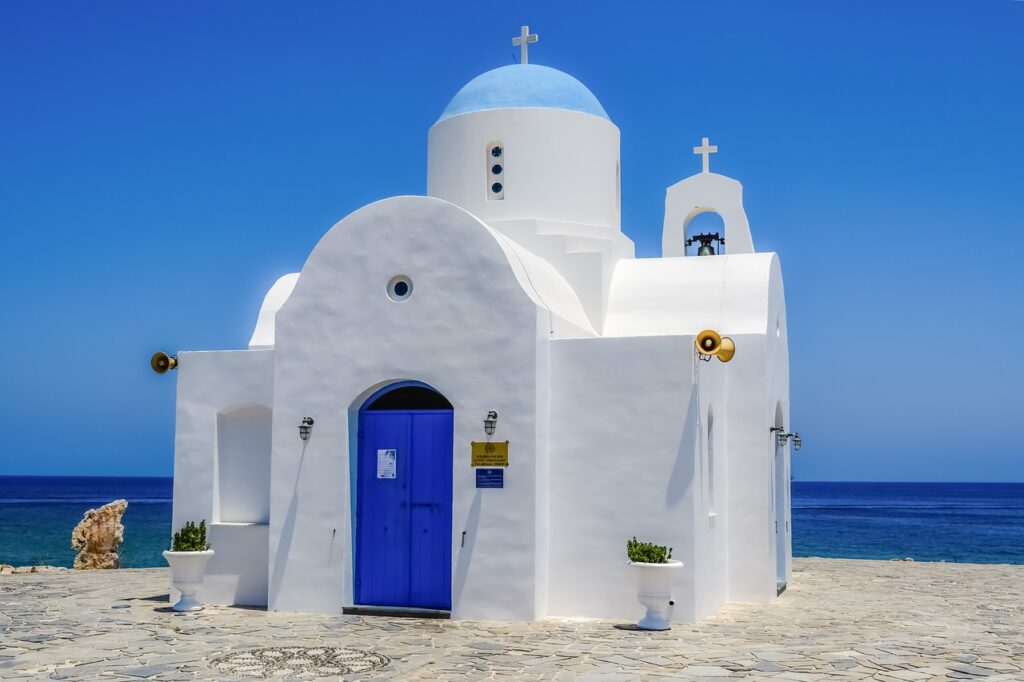
Culture:
Cyprus is an island country with its distinctive identity enabled by its strategic location, history, and geography. Its culture is dynamically composed of traditional and modern elements emanating from its Greek, Turkish, and Byzantine roots.
Cyprus has a high level of cultural history, with traces of human existence back to the 10th millennium BC. Successively, the island has been occupied by the Assyrians, Persians, Romans, Byzantines, Lusignans, Venetians, Ottomans, and British. Each one of them has touched Cypriot culture, architecture, and traditions.
The core of traditional culture among Cypriots is hospitality; that is the quality for which Cypriots are well-known: warm and hospitable. Family values are deeply entrenched, and close-knit families, along with respect for elders, are paramount. Most Cypriots are Greek Orthodox Christians, although there is a sizeable Muslim minority. They are a proud people who hold dear their folk music and dancing-the sousta and syrtaki being highly regarded forms of dance at cultural gatherings. The artisans are valued for their skills in pottery, weaving, embroidery, and woodcarving.
Spectacular Byzantine churches dot the cultural landscape of Cyprus, and ten are UNESCO World Heritage Sites. Medieval castles, such as the Larnaca Fort and Kyrenia Castle, stand tall, bearing witness to the island’s tumultuous past. The rich history and cultural heritage of the island have been showcased in the Cyprus Museum located in Nicosia, while Cypriot artists gave the world of modern and contemporary art big jolts.
Cypriot food is a great blend of Greek and Turkish, with an addition of Middle Eastern tastes. It boasts of halloumi cheese, souvlaki, fresh seafood, and traditional sweets like galaktoboureko and baklava. Cyprus celebrates a number of festivals and events through the year: Easter, Kataklysmos-a water-themed festival that celebrates the biblical flood, Cyprus Food Festival, and Paphos Aphrodite Festival.
Cyprus has gone through a cultural renaissance in recent years; there is far-reaching, contemporary art and traditional music influenced by Western and Eastern styles. The Cyprus Film Industry is growing, with international productions shooting on location. Education remains a priority with a number of universities and institutions that further cultural exchange.
Despite all the rich cultural heritage, Cyprus faces some very serious problems with maintaining traditions and its cultural identity. Some efforts have been made in protecting the cultural sites, promoting cultural education, and supporting traditional crafts. UNESCO recognized the importance of the cultural sites of Cyprus and has laid efforts in making the younger generation of the country more aware of the cultural heritage.
The Cypriot culture is a tapestry of tradition, history, and diversity. From the brilliant architecture to the delectable food, one finds a peculiarly kaleidoscopic culture in Cyprus. While the island nation keeps on changing with time, it remains conscious of its cultural heritage and preserves it for future generations.
Accommodations:
To broke backpackers, the travel prospects through Cyprus can be pretty daunting. With its amazing beaches, ancient ruins, and pulsating culture, this island nation does seem tailor-made for luxury seekers. But for the ones that take the leap of faith, budget hostels of Cyprus promise an unforgettable experience that is as much about the people as the place.
Speaking of places to stay, the cheapest accommodations often come with a warning: “you get what you pay for.” But not in Cyprus. The island’s budget hostels are nestled down quiet alleys and side streets, just waiting to be found.
By booking in the cheapest options, travelers open themselves up to a world of unpredictability. Will the hostel be a quaint family-run affair, or some kind of ramshackle party den? Will the dorm mates be fellow travelers, or eccentric locals? The uncertainty is all part of the charm.
These budget hostels, more often than not, are passionate projects of individuals who have opened their residences to form dynamic shared spaces. Owners act as tour guides, cooks, and confidants as they share stories about the best-kept secrets and insider tips on Cyprus. They treat guests like part of an extended family, bonding them over impromptu meals and jam sessions.
And it’s in these low-profile hostels that the lines between guest and local get blurred. Travelers find themselves getting swept up in spontaneous excursions to secret waterfalls, midnight strolls through ancient villages, or impromptu traditional dance lessons. In an atmosphere fostered by infectious enthusiasm and generosity on the part of the hosts, strangers become fast friends.
Then there is the eclectic mix of travelers frequenting the budget hostels of Cyprus. Be prepared to share a room with free-spirited artists, wandering musicians, and fellow adventurers who congregate at these establishments. Such accidental meetings may lead to lifelong friendships or spontaneous collaborations.
Of course, this comes with risks. Budget hostels can be rough around the edges, with creaky beds and makeshift facilities. But if one can look beyond a little lack of comfort in favor of character, then the rewards are really well worth the drawbacks.
The beauty of the budget hostels in Cyprus lies in their imperfections: a wonky shower or a lopsided bed becomes a badge of honor, a reminder of adventures that unfolded beneath its roof. In swapping these stories, travelers make hostels the characters in the narrative-quirky, flawed, and utterly charming.
For the really broke backpackers, the budget hostels of Cyprus are more than a facility for having a roof above the head. They are a doorway into the raw spirit of the island-a chance to witness real Cyprus that hardly winds up in the glossy travel brochures.
So, if you want to have the most different, insane, and great experience from Cyprus’ hostels, take your chance with the cheapest. Book without any expectations, arrive tuned, and let the hidden treasures of the island unfold in front of you. As so ineloquently mentioned by another seasoned traveler, “The best hostels are the ones that leave you with stories to tell, not just memories to cherish.”
The stories, in a way, wait to be written in budget hostels of Cyprus. The only thing you have to do is just appear.
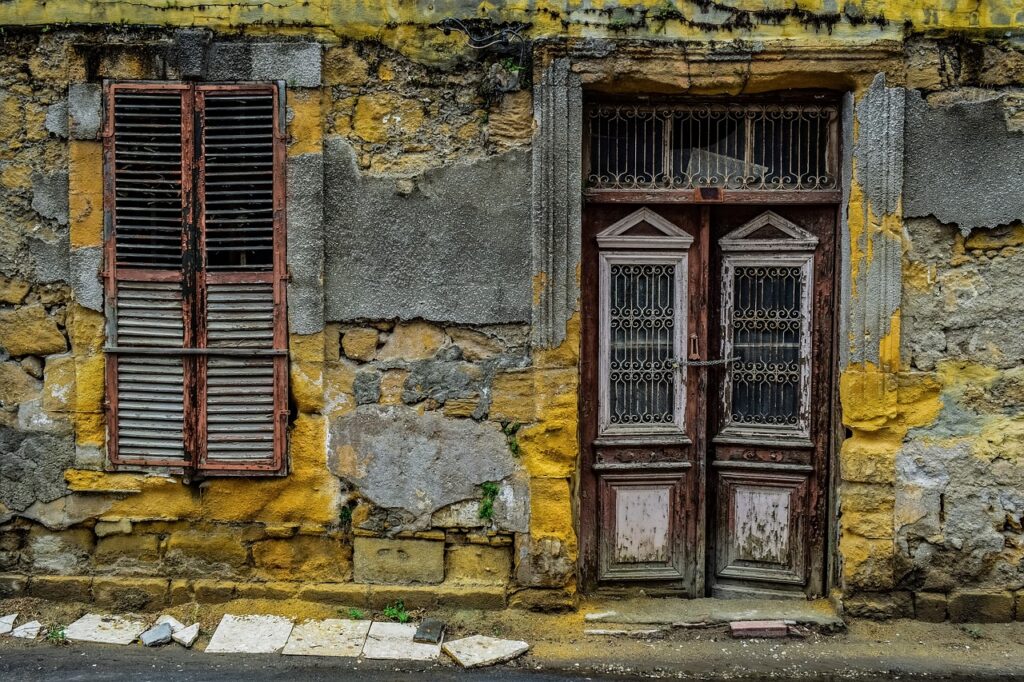
Nightlife:
Cyprus, when the sun sets over the Mediterranean, becomes a crazy eclectic night-life scene that is also rather accessible to the poorest of backpackers. Beyond Ayia Napa’s glittery array of bars and clubs, there is a whole treasure chest of hidden gems one could try.
For broke backpackers, nightlife in Cyprus offers an unlikely highlight-from impromptu beach parties to underground music venues, the island after dark is a hotbed of culture, music, and revelry combined.
Probably the best-kept secret of the nightlife in Cyprus is its infectious spontaneity. Casual strolling down a street in Larnaca or Paphos often leads one to a jamming session or an underground art exhibition. These events constitute the lifeblood of the island’s alternative scene, creativity and self-expression being the king.
Students comprise a large part of the nightlife in Cyprus. These university towns, Nicosia, and Limassol, therefore, are alive with students and travelers alike, sharing stories, music, and laughter. Such activity will eventually find its way to the streets, where quiet alleys are suddenly turned into impromptu dance floors.
It is also equivalently varied on the field of music, reflecting the complex cultural heritage of Cyprus from traditional folk tunes to state-of-the-art electronic beats. Dynamically combined, East meets West in this soundscape. Live music venues tucked away in the most unlikely corners showcase local talent and traveling musicians, creating an intimate atmosphere that’s hard to find in more commercial hotspots.
For a far more laid-back experience, the beach bars across Cyprus offer the serenity one would want. These havens of the ocean turn into beckoning gathering spots at night, as the stars begin to sparkle above, where travelers can share tales of adventure over cold beers and warm company.
Nightlife weaves into the very fabrics of Cypriot celebrations and events, from water festivals like Kataklysmos to the more cultural Paphos Aphrodite Festival throughout the year. Locals, as well as travelers, bring the fun, creating such an electric atmosphere that it just cannot be ignored.
Yes, the flashy clubs of Ayia Napa get all the headlines, but the true magic of Cyprus nighttime happens in gatherings that are unassuming and rough around the edges. Underground events pop up via word-of-mouth or through a series of cryptic social media posts-these are at the heart of the island’s alternative scene.
From the poor backpackers, all one needs to discover the true nightlife of Cyprus is a sense of adventure combined with curiosity. Just go out onto the streets, follow the sounds, and talk with the locals. Many nights here on the island are best when not actually planned; they evolve with strangers who will become your friends.
Of course, when the night falls, Cyprus belongs to gamblers. So take a bottle of wine and join the party, while the hidden nightlife gems of the island unfold before your eyes. As one seasoned traveler once put it, “The best nights in Cyprus are the ones you never planned.
Backpacking Cyprus costs:
Daily Expenses (Up to €20):
Accommodation: €10-12 (basic hostel or dormitory)
Food: €4-6 (street food, markets, or cooking own meals)
Transportation: €2-3 (public buses or hitchhiking)
Attractions: Free or €2-3 (beaches, hiking trails, cultural sites)
Miscellaneous: €2-5 (souvenirs, snacks, unexpected expenses)
Total: €18-20 per day
Weekly Expenses:
Accommodation: €70-84 (avg. €10-12 per night)
Food: €28-42 (avg. €4-6 per day)
Transportation: €14-21 (avg. €2-3 per day)
Attractions: €14-21 (avg. €2-3 per day)
Miscellaneous: €14-35 (avg. €2-5 per day)
Total: €126-203 per week
Conclusion:
But I can say that in retrospect, the beauty of Cyprus really lies in its unpredictability-from impromptu beach parties to hostels hiding in every nook and cranny, from music venues underground quite literally to impromptu lessons in traditional dance. Cyprus can only be predicted to be a destination that will catch you off guard at all times.
Cyprus is a place of blurred lines between luxury and roughing it, where five-star views can be salivated from a rocky outcropping and where the Cypriots can make a lifelong friend out of a stranger with their warmness.
To the bold and intrepid, Cyprus is as much the journey as the destination-a place where the beauty in the unknown is sewn into every sunset, every conversation, and every meal eaten out of a kitchen drawer with your fellow wanderers.
Broke backpacking in Cyprus isn’t just about scraping by; it is supposed to mean finding that raw, unpolished charm of the island. This means the discovery of hidden coves and secret waterfalls, finding underground art scenes that lie well beyond glossy brochures.
And as I bid adieu to this most mythical of islands, what I’m left with is gratitude for those accidental meetings, the serendipity of discovery, and remembered moments tempered into fire by spontaneity. Ah, Cyprus-you did not break into my bank, but yes, you stole my heart.
I say this to fellow broke backpackers: do not be deterred by the perception that Cyprus is a little out of your league. Take a gamble, book that grimy hostel, and let the island’s volatile charm sweep you off your feet. Because in Cyprus, the best experiences are often the ones you never planned.
Until the next adventure.
